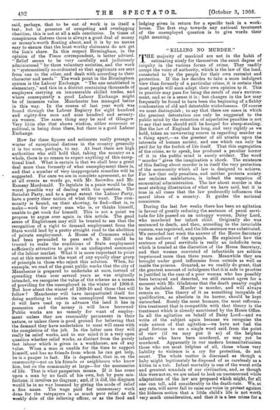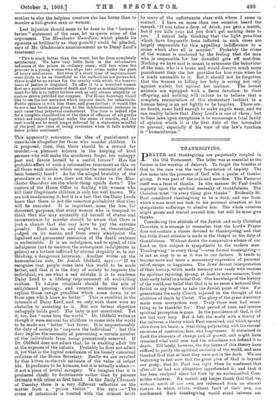" KILLING NO MURDER." T HE majority of mankind are not
in the habit of estimating nicely for themselves the exact degree of iniquity in the various forms of crime. They readily accept the voice of authority, which is the law of the land, consented to by the people for their own restraint and protection. If the law decides to take a more indulgent view than formerly of a particular crime, it is certain that most people will soon adapt their own opinion to it. This in practice may pass for being the result of one's environ- ment, and so in a sense it is ; but changes in the law may frequently be found to have been the beginning of a flabby.
condonation of old and detestable wickednesses. Of course- we must distinguish ; to say that there are cases in which: the greatest detestation can only be suggested to. the.
public mind by the retention of superlative penalties is not to say that men should still be hanged for sheep-stealing. But the law of England has long, and very rightly as we hold, taken an unwavering course in regarding murder as.
a thing apart,—as the greatest of all attacks upon the interests of human society, and one which can only be paid for by the forfeit of life itself. That this segregation- of the crime, so to speak, has produced a peculiar horror of it in the public mind is surely evident. The word. " murder " gives the imagination a shock. The existence- of this feeling about murder is in itself the very protection of the community which all law is designed to achieve. For law that only penalises, and neither protects society nor reclaims malefactors, is indeed the negation of economical administration. The law about murder is the most striking illustration of what we have said, but it is true in all cases that the law profoundly influences the moral ideas of a country. It guides the national conscience.
During the last few weeks there has been an agitation. in favour of greatly reducing the sentence of penal servi- tude for life passed on an unhappy woman, Daisy Lord, who murdered her infant child. Originally she was sentenced to death, and then, according to the invariable custom, was reprieved, and the life-sentence was substituted. We recorded last week the answer of the Home Secretary to the authors of the appeals. He explained how the sentence of penal servitude is really an indefinite term which is treated at the discretion of the Home Secretary; and that women convicted of infanticide are seldom imprisoned more than three years. Meanwhile they are brought under good influences from outside as well as inside the prisons. Granted, as we readily do grant, that the greatest amount of indulgence that it is safe to practise is justified in the case of a poor woman who has possibly been betrayed and deserted, we still cannot agree for a moment with Mr. Gladstone that the death penalty ought to be abolished. Murder is murder, and will always remain so. The theory of it as something incapable of qualification, as absolute in its horror, should be kept untouched. Surely the most humane, the most reforma- tive treatment that is compatible with that theory is the treatment which is already sanctioned by the Home Office. In all the agitation on behalf of Daisy Lord—and we write of the subject again because we recognise the wide extent of that agitation—we have not had the good fortune to see a single word said from the point. of view (if we may put it so) of the helpless infants who have been murdered, or may yet be murdered. Apparently in our modern humanitarianism those who are most helpless of all, those whose very liability to violence is a cry for protection, do not count. The whole matter is discussed as though a, baby might legitimately be disposed of as carelessly as a kitten in a tub. Infant mortality is one of the worst evils and greatest scandals of our civilisation, and, as though this were not so, we are asked to look on unconcerned while adaptations of the law are proposed which might, for all one can toll, add considerably to the death-rate. We, at any rate, will never fail to raise our voice in protest against the hideous notion that a little child's life is not worth very much consideration, and that it is a less crime for a mother to slay the helpless creature she has borne than to murder a full-grown man or woman.
Lest injustice should seem to be done to the " humani- tarian " statement of the case, let us quote some of the arguments. The Manchester Guardian, which pleads its opinions as brilliantly as they possibly could be pleaded, says of Mr. Gladstone's announcement as to Daisy Lord's treatment :— " This is much better than the worst, but far from completely satisfactory. We have very little faith in the reformative influence of the prison in ordinary cases ; still less when the prisoner is a young woman who slips into crime under the push of heavy misfortune. But even if a short time of imprisonment were likely to be as beneficial as the authorities are persuaded, there could be no excuse for the cruelty with which the benevo- lence of justice is disguised. To offer it to a wretched woman first as a nominal sentence of death and then as nominal imprison- ment for life is to inflict torture such as only obtuse stupidity or custom grown petrified can compass. The Home Secretary would like to see the law amended which imposes death for infanticide. Public opinion is with him there, and goes further; it would like to see a less harsh name given to the indeterminate sentence in such cases than perpetual confinement. The time is indeed ripe for a complete classification of the chaos of offences of all grades which are lumped together under the name of murder, and the task would not be much longer deferred by a statesman mindful of the peril law runs of losing reverence when it falls notably below public sentiment."
This apparently renounces the idea of punishment as unsuitable altogether for those who murder children. Is it proposed, then, that there should be a reward for murder,—a pleasant sojourn in the keeping of kind persons who will make the murderess forget her unhappy past and devote herself to a useful future ? Has the probable effect of such a reformative treatment as this on all those weak minds which require the restraint of dread been honestly faced ? As for the alleged brutality of the procedure as it is now, does not the writer in the Man- chester Guardian see the whole thing upside down? The custom of the Home Office in dealing with women who kill their illegitimate children is only too well known. We are notcondemning it, but it is a fact that the Daisy Lords know that there is not the remotest probability that they will be executed. It is important, none the less, for deterrent purposes, that every woman who is tempted to think that she may excusably rid herself of shame and inconvenience by murder should be aware that there is just a chance that she may have to pay the extreme penalty. Each case is, and ought to be, theoretically, judged on its merits, and from every standpoint the legalised and permanent remission of the death sentence is undesirable. It is an indulgence, and to speak of this indulgence (not to mention the subsequent indulgences in prison) as a torture inflicted by obtuse stupidity is, to our thinking, a dangerous inversion. Another writer on the humanitarian side, Dr. Josiah Oldfield, says :—" If we recognise that people come into this world to be made better, and that it is the duty of society to improve the individual, we see what a sad mistake it is to condemn Daisy Lord to a lifelong imprisonment of soul-killing routine. To nform criminals should be the aim of enlightened penology, and curative sentences should replace those savage penalties which come down to us from ages which knew no better." This is excellent in the interests of Daisy Lord, and we only wish there were no obstacles to assenting to it. But our former objection unhappily holds good. The baby is not mentioned. Yet it, too, has " come into the world." Dr. Oldfield writes as though it were natural for children to come into the world to be made not " better" but fewer. It is unquestionably the duty of society to " improve the individual " ; but this duty implies the necessity of preventing a certain number of the individuals from being prematurely removed. If Dr. Oldfield does not admit that, he is exalting adult life at the expense of the infants. Probably he does not admit it, yet that is the logical conclusion of his loosely conceived criticism of the Home Secretary. Really we are revolted by this kitten-in-the-tub estimate of the value of infant life. It professes to be humane, but it is actually a sham,— if not a piece of brutal savagery. We imagine that it is professed chiefly by doctrinaires rather than by persons intimate with crime at first hand. In the Daily Chronicle of Tuesday there is a very different reflection on the matter from a " prison visitor." She says :—" The crime of infanticide is treated with the utmost levity. by many of the unfortunate class with whom I come in contact. I have on more than one occasion heard the remark, 'If you takes a drop of drink, you gets a month, but if you kills your kid you don't get nothing done to you.' I cannot help thinking that the light penalties which have frequently been inflicted in such cases are largely responsible for this appalling indifference to a crime which after all is murder." Probably the crime of the woman is condoned by the feeling that the man who is responsible for her downfall gets off scot-free. Nothing we have said is meant to extenuate the behaviour of the man, who is a brute, and would deserve much more punishment than the law provides for him even when be is made amenable to it. But it should not be forgotten that the woman in killing her baby is erring not only against society but against her instinct. The lowest animals are equipped with a fierce devotion to their offspring, and nothing will induce us to believe that a complete renunciation of this elementary instinct in a human being is an act lightly to be forgiven. There are, no doubt, cases hard enough to make angels weep, and we can readily believe that Daisy Lord's is one of them • but to base laws upon exceptions is to encourage a fatal laxity of opinion which it is the first duty of the lawmaker to prevent, especially if his view of the law's function is " humanitarian."

























































 Previous page
Previous page